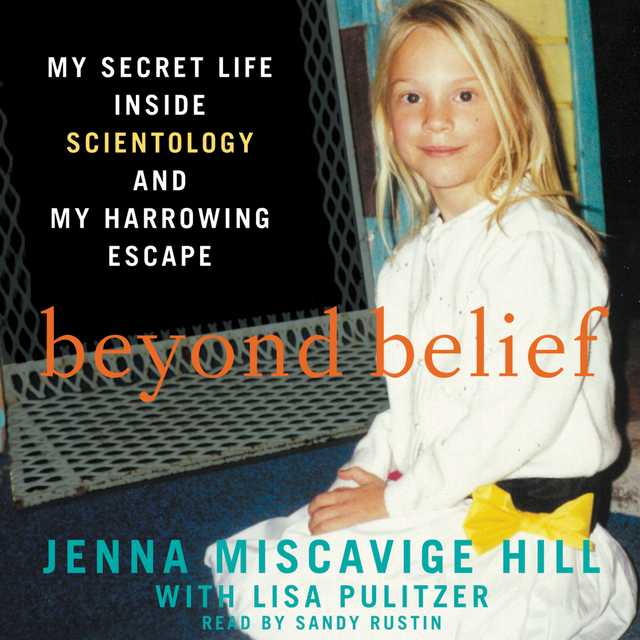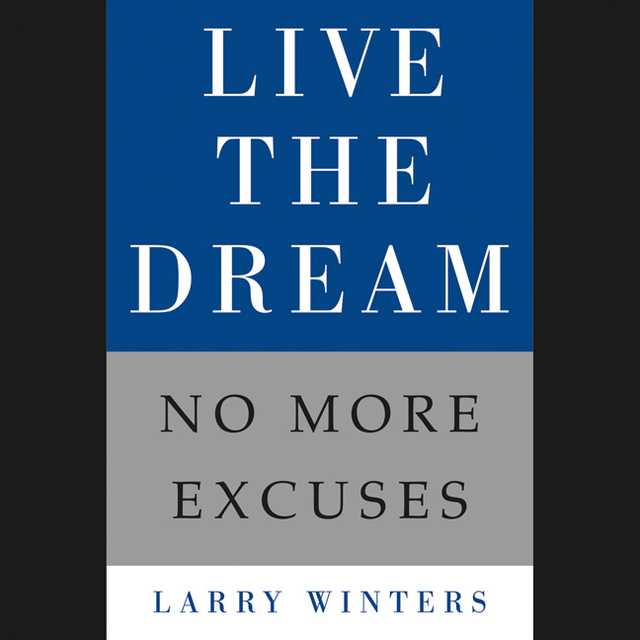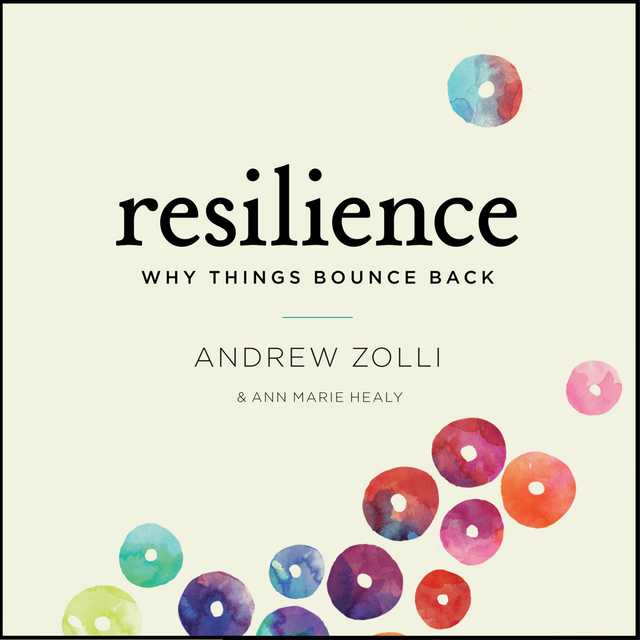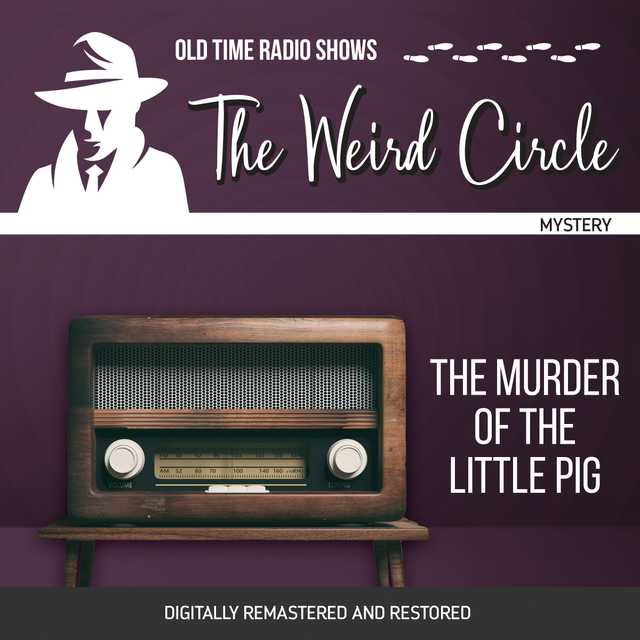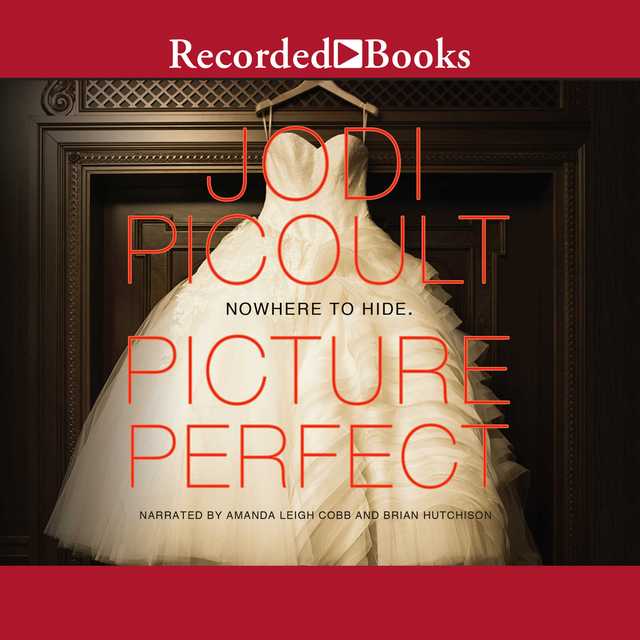Beyond Belief Audiobook Summary
Jenna Miscavige Hill, niece of Church of Scientology leader David Miscavige, was raised as a Scientologist but left the controversial religion in 2005. In Beyond Belief, she shares her true story of life inside the upper ranks of the sect, details her experiences as a member Sea Org–the church’s highest ministry, speaks of her “disconnection” from family outside of the organization, and tells the story of her ultimate escape.
In this tell-all memoir, complete with family photographs from her time in the Church, Jenna Miscavige Hill, a prominent critic of Scientology who now helps others leave the organization, offers an insider’s profile of the beliefs, rituals, and secrets of the religion that has captured the fascination of millions, including some of Hollywood’s brightest stars such as Tom Cruise and John Travolta.
Other Top Audiobooks
Beyond Belief Audiobook Narrator
Sandy Rustin is the narrator of Beyond Belief audiobook that was written by Jenna Miscavige Hill
Jenna Miscavige Hill was raised as a Scientologist. Since leaving the organization in 2005, she cofounded the website www.exscientologykids.com, which features the stories of current and former Scientologists and supports those who choose to leave the organization. She lives in Southern California.
About the Author(s) of Beyond Belief
Jenna Miscavige Hill is the author of Beyond Belief
More From the Same
- Publisher : HarperAudio
- Abraham
- American Gods [TV Tie-In]
- Dead Ringer
- House of Sand and Fog
- Prey
Beyond Belief Full Details
| Narrator | Sandy Rustin |
| Length | 11 hours 57 minutes |
| Author | Jenna Miscavige Hill |
| Category | |
| Publisher | HarperAudio |
| Release date | February 05, 2013 |
| ISBN | 9780062262479 |
Subjects
The publisher of the Beyond Belief is HarperAudio. includes the following subjects: The BISAC Subject Code is Biography & Autobiography, Personal Memoirs
Additional info
The publisher of the Beyond Belief is HarperAudio. The imprint is HarperAudio. It is supplied by HarperAudio. The ISBN-13 is 9780062262479.
Global Availability
This book is only available in the United States.
Goodreads Reviews
Always
February 11, 2020
Jenna was raised with Scientology and stayed with the church until 2005. The writing was pretty good for a memoir and I really enjoyed reading it. I think a lot of people who didn't like it were people who expected something dramatic, which I guess the title doesn't help, but the whole point was to reveal what it was really like growing up in the church and the way they brain wash people basically into believing all those things. Jenna did a good job of showing her slow but steady disillusionment with the church and I learned a lot about that I didn't know, none of which is okay even if it's not the worst thing that's happened in a cult. I think it's really good that people speak out about these things because when you don't know any better it's so easy to get sucked into things like Scientology. The ending was a little flat for me but I think this is a really good memoir or autobiography about living with Scientology and the way it affects people's lives.
Arah-Lynda
July 10, 2016
Jenna was raised to obey. She is the niece of the leader (David Miscavige) of The Church of Scientology. While still a toddler, Jenna’s parents became members of The Sea Organization, the church’s, elite, inner clergy. Such membership demanded all of their time and attention, leaving Jenna and her brother to be raised by other caretaker members of the Church, until their formal education at “the Ranch” began at the age of seven. The clocks do not strike thirteen in Jenna’s world and this is not some imaginary place, but people still call her mother Sir. I had to remind myself of these things as I read her indoctrination to a life that served the greater good of The Church. A life of work, study, measure; audit, correct and control. Lather, rinse, repeat; Jenna’s was a life of strictly imposed conformity, strange rituals, back breaking work, mind- numbing, repetitious training routines; with endless audits, peer evaluation, hunger, sleep deprivation and an active, obsessively enforced devotion to L. Ron Hubbard and his teachings. During our course period, we were now required to get a daily meter check, to be administered by a supervisor. The supervisor would use an LRH invention called an electro-psychometer, but everybody called it the E-Meter. The person being assessed held two soup cans. Then, a tiny electrical current was passed through the cans into his body as he was asked questions. The E-Meter had a needle, and after each question, the needle would fluctuate; those movements were then interpreted by the person operating the machine. By carefully watching the motions of the needle, the operator supposedly could figure out whether someone was telling the truth. The E-Meter was viewed as a tool that helped the auditing process.Jenna tells her story in a very down to earth, matter of fact, child like voice, that drew me in right away and was easy to understand despite all the Scientology speak that litters the narrative.I read this three weeks and three books ago and I have still not succeeded in evicting Jenna’s world from my mind. It is like an inner rage that cannot be quieted. I have sat down several times now in an attempt to purge this rage by writing this review, still it remains unquiet. Maybe that’s because despite all the controversy over the real number, Scientology still has thousands of followers or perhaps because children are still being raised on one version or another of The Church’s “ranches” or could it be that this oppression that starts with a c and shares a u, but should never be considered a church; also enjoys public endorsement from some rather well known celebrities.It is alive and well and thrives among us, in a free and democratic country. The quiet my mind seeks eludes me. A final thought from the founder himself, L. Ron Hubbard, whose own death is shrouded in mystery and controversy.If you want to make a little money, write a book. If you want to make a lot of money, create a religion.
Mariah Roze
April 10, 2017
I chose this book because a friend of mine on Goodreads read it and loved it. Also, I love learning about different religions, especially when people take religion to the extreme. Like in Jenna's situation. She was born into a extreme situation of Scientology.Jenna Miscavige Hill is the niece of the Church of Scientology's leader David Miscavige. This gave her a different perspective and experience growing up then the other scientologist around her. THis helped her in the beginning to get some special treatment, but later on made her punishments and watchful eyes more intense.When I started reading this book the thought occurred to me about not knowing much about Scientology. This book explains why. There can be harsh punishment for those that speak out against Scientology and the religion tries to keep the public eye out of their private matters. That is why Jenna's words and book is so important. It has shine a light on a childhood that most people are unaware of that exists in the US.Growing up Janna's family was forced to have prolonged separation from each other to serve the greater good of the Church. This is also why the environment was rooted in control. When breaking the rules or they assumed you broke the rules the members would face harsh punishments."Despite this hardship, it is only when her family approaches dissolution and her world begins to unravel that she is finally able to see the patterns of stifling conformity and psychological control that have ruled her life. Faced with a heartbreaking choice, she mounts a courageous escape, but not before being put through the ultimate test of family, faith, and love. At once captivating and disturbing, Beyond Belief is an eye-opening exploration of the limits of religion and the lengths to which one woman went to break free."This book was phenomenal and the author was so personable. I am glad that she is standing up to the unfair treatment of her childhood and I suggest this book to everyone!
Esil
December 10, 2015
I listened to the audio of Beyond Belief. I could have been listening to some kind of scary fiction, but I was hearing the author's story of her life growing up in the church of Scientology. I didn't know much about Scientology before starting other than it seems to attract a bunch of celebrities and it is based on the sci-fi thoughts of L. Ron Hubbard. Jenna Miscavige Hill is the niece of the leader who succeeded Hubbard. Her parents moved onto one of the church's bases when she was two years old. And she spent the next 18 years or so of her life living in a crazy world in which she was separated from her parents for years at a time, performed countless hours of child labour, was deprived of a true education and instead subjected to endless mindless sessions of what can only be described as brain washing, was severely punished for any attempts to rebel, and ultimately made her way out of the church to become an outspoken supporter of other former church members. The world she describes is indeed "beyond belief", but Jenna clearly has a strength of character that has allowed her to emerge with a strong sense of self and purpose, and to that extent at least the book is very positive. Don't read this book if you are looking for a shocking or scandalous narrative that reveals the secrets of various celebrities or church members. Rather, Hill's narrative is a slow methodical description of her life in the church and her escape. She describes what happened from her perspective as it was happening, without inserting information she now knows about what was really going on -- this comes more toward the end of the narrative. To me, this is what made it so powerful -- such an unconsciounable way to raise a child is described in a simple deadpan fashion -- slowly Jenna comes to realize that the world she understands as normal is small, insular and abusive, and that she doesn't have to be part of that world. The audio version was particularly good because the narrator's voice uses just the right tone to convey this world as seen through a child's eyes, then as a teenager and finally as a young adult.
Ross
August 26, 2019
I've done a fair amount of reading, watching and personal investigation into the topic of Scientology, and somehow I wasn't expecting to get a lot of new information from this book. I was wrong. In Beyond Belief: My Secret Life Inside Scientology and My Harrowing Escape, Jenna Miscavige Hill shares in impressive detail what it's like to be raised within Scientology and recruited at the tender age of 7 into Scientology's clerical order, the Sea Org. Her name alone encodes some of the story: anyone familiar with Scientology knows that its current leader is David Miscavige, who wrested control shortly after L. Ron Hubbard's death in 1986. David is Jenna's uncle, and her father is David's brother. You might think that would give her and her family privileged status within the church, and you'd be right... but as with all things in Scientology, it's complicated and unsustainable.When Jenna's parents committed themselves to service in the Sea Org, they made a conscious decision to not be able to actively parent their children, and Jenna often went years without seeing them, even when living/working nearby. She was placed into a "ranch" with other Scientology children and forced to do labor and perform responsibilities no 7-year-old should ever have to think about, such as managing injuries and the health needs of her fellow children. In Scientology, children are considered small adults, as they are simply vehicles for the same trillions-year-old Thetans everyone else is: no coddling or sympathy, let alone hesitation to have them sign a billion-year contract of service in the Sea Org. Jenna poignantly recalls worrying about her handwriting not being good enough as she signs the contract.Scientology training is grueling, unforgiving, endless, pointless, and above all things... completely at odds with the needs of basic human nature. As she ages and moves from base to base, Jenna recounts countless hours of studying L. Ron Hubbard's "technology", fighting to conquer "misunderstood words", auditing on and off the e-meter, confessing crimes of thought and deed (whether or not they have basis in reality), ratting out other children for their minor infractions (written in unending "knowledge reports"), and constantly being put in a place of punishment that must be recompensed with hard labor and study. If something bad happens to you, it is because you did something wrong. If the meter says you have a thought crime, you'd better fess up or make something up, because they will not stop your "sec check" interrogation until you do. The moment you fall out of line, you'll be shouted at and told you're worthless, an ingrate, and a pampered brat. It's exhausting just to hear about.Occasionally she gets to see her parents, and is impressed with the relatively posh and comfortable lives they lead... until they too fall afoul of Scientology and are punished and edged out. Occasionally she sees her brother, who similarly can't stand the misery and is driven out of the church. Occasionally she interacts with her Uncle David (who doesn't even take Scientology coursework himself and dotes on Jenna until she and her family become a problem for the church) and Aunt Shelley (who is capricious and vindictive, and I feel slightly less bad about her having been missing from public eye since 2007). Occasionally Jenna gets to see family outside of the Sea Org, but never quite long enough to disengage with her brainwashing. Most of the time, however, she is busy being worked insane hours for measly pay (when it's not withheld altogether), studying "tech", trying to stay out of trouble, and remaining systematically disconnected from the outside world. Jenna fights hard to check all the right boxes and stay in the good graces of the church. She wants her Scientology life, and to fulfill her goal of being an auditor.Eventually, as it seemingly does for all its most dedicated members, Scientology chews up every last vestige of humanity. Jenna describes interactions with the likes of Marc and Claire Headley or the Rathbuns, or even her grandpa Ron... all of whom I had already heard about having "blown" Scientology. I'm constantly amazed that anyone is left with the rate that this so-called religion chews up and spits out its own. Jenna makes the mistake of falling in love, and that is where Scientology is at its worst in combating basic human nature. Any acted-upon attraction while in the Sea Org is potentially "out 2D" (in violation of the proper expression of the second dynamic (it's a long story, there's eight dynamics)). The Miscaviges also have their precious name to be protected, and are worried about bad PR for the church, so they constantly monitor Jenna from afar and engineer her life. This is where the rest of her name encodes the end of the story: Jenna wants to marry Dallas Hill, a fellow Sea Org member, but Scientology arbitrarily blocks them, and eventually they commit the great sin of having sex. It is Jenna's desperation to stay with Dallas, her increasing resistance to Scientology's control, and the offer from her ousted parents to provide for her, that eventually allow her to escape.It's a wild story, and beautifully told. The writing is excellent, and the narration I listened to is also very well performed. Highly recommended.
David
November 20, 2015
In the U.S., religion and the freedom to practice it is a kind of shibboleth — because we have enshrined the First Amendment, we are very reluctant to impose any sort of restrictions on religious practice, and even most people who don't care for a religion will be loathe to categorically state any particular religion is wrong, bad, or evil. The exceptions are generally either bigots or folks whose own religious beliefs are so exclusionary that by necessity they must regard all other faiths as antagonistic.L. Ron Hubbard and his church have taken great advantage of this fact, running what can only be called a pyramid scheme organized like a police state but wearing the trappings of religion. Any objective study of Scientology, its history, and its methods will not allow a reasonable person to come away in doubt as to its nature. And yet we have to put up with Scientologists donning the First Amendment to shield themselves from criticism while engaging in the most despicable dirty tricks against their enemies (who are legion, especially in LRH's paranoid cosmology).When I read another book about Scientology, Inside Scientology: The Story of America's Most Secretive Religion, by Janet Reitman, one of the things I wondered was how do they actually get people to believe this shit? And what makes people stay in such an abusive, irrational cult when they could walk away at any time?That book gave two answers: first, the Internet has not been good for Scientology, which is why their members are generally forbidden to access it. Second: the remaining hardcore "faithful" are basically the children and grandchildren of Scientologists who grew up in the "church" and have never known anything else.That is the perspective of Jenna Miscavige Hill, who is the niece of David Miscavige, current leader of Scientology and heir to L. Ron Hubbard's empire. She was born and raised into Scientology, and even as the surrounding world seeped into her awareness, she was essentially kept in a Scientology bubble until her late teens. Given this, it becomes a little surprising that she rebelled as much as she did.For anyone who's read other books about Scientology, there won't be much new information here, but Jenna Miscavige Hill gives an unrelentingly grim picture of the "church," without even meaning to, because while in her conclusions, following her escape, she makes it clear that she considers the church and its leaders to be abusive, lying, and unethical, everything she experienced along the way was "normal" for her, so perhaps the full horror of growing up in what amounted to a system of work camps supervised by snitches and political officers ready to take away even the smallest privileges and shut you in a room to be yelled at for hours at the slightest breach of rules, never completely registered with her. She learns, only after leaving the church, how "weird" other people find her upbringing.For all that she had such an exceptional and scarring upbringing, Hill is personable and clearly a person of integrity (it was her unwillingness to throw friends and family under the bus on demand, which the Church of Scientology demands frequently, that consistently got her into trouble). The church very carefully tiptoes around the law, so most of their practices aren't quite illegal as long as their members voluntarily submit to it - which they do, because the deeper you become immersed in the church, the more it makes up your entire world, and support system, and life, and to be cast out and declared a "Suppressive Person" can leave many of the faithful with literally nowhere else to turn.Against the background of Scientology, Hill's day to day life is actually pretty mundane, and many of her tribulations are just the normal ones of a slightly mouthy teenager feeling her oats. Even Scientology can't keep kids from being kids, nor can they keep star-crossed lovers apart. Well, actually they can, and do, but not always. They separated Hill from her first love, and almost turned her husband against her while they were still in the church and on the cusp of leaving, but eventually they did leave, still negotiating the church's insane and cumbersome rules so as not to be excluded from ever talking to their families again.Scientology is strange, perverse, and frankly evil in its execution, an engine for extracting money from its followers and suppressing every independent thought. Like most religions, it comes with doctrines and an origin story and fine-sounding gospel about how to make the world a better place.Needless to say, Hill and her husband find the discovery of Operation Clambake, and the infamous South Park episode on Scientology, to be eye-opening.Hill is a bit too credulous in places, particularly when she praises anonymous for their act of hacking Scientology websites and taking them briefly offline. To her, this was a worldwide movement of activists standing up for her and other victims of the church, when of course anyone familiar with anonymous knows that while they might sometimes seize on a good cause for their shenanigans, they do everything for the lols. She's also frequently (in her retelling of her behavior) whiny and annoying, though given how young she was and what she was being put through, this is understandable.Jenna Miscavige Hill is really a fairly unexceptional person who grew up in what to most of us is an extreme environment, and came out of it as normal as can be expected. Her memoir will fill you in on the details of Scientology's operations and what it's like to be a Scientologist, and should scare off anyone even remotely considering treating this cult as a legitimate religion or a place to find answers.
Malia
January 07, 2021
I went into this with fairly strong preconceived notions of what I would find. Scientology may be mysterious, but everything I had heard of it previously was disconcerting. Beyond Belief only emphasized my impression of something I can only describe as a cult. The Church of Scientology seeks to control individuals from as early an age as possible, brainwashing, separating families and putting children to work when they should be in school. It's so bizarre that an organization like this is allowed to function as though it carries legitimacy.As for Miscavige Hill, she goes into great detail about her experiences with the church, not shying away from events that must have ranged from embarrassing to traumatic. I do think it was a little long-winded and repetitive at times, and I found myself shaking my head in disbelief at her frequent naiveté, but then remembered, she was a part of this madness from the time she was a little child into early adulthood. All in all, a strange and intriguing story that leaves me with little doubt that Scientology is deeply problematic much like any fundamentalist ideology.Find my book reviews and more at http://www.princessandpen.com
aPriL does feral sometimes
April 10, 2017
In the book 'Beyond Belief' Jenna Miscavage Hill describes in detail how the Scientology Church worked. Her descriptions of the church actually fits every line of the list on how to run a mind-control cult, using the proven indoctrination methods of authoritarian regimes, prisons, religious cults and military units the world over. She discusses what happened to her in which she was made to accept the teaching of Scientology from early childhood to her adult life. The only thing benign about what Jenna describes in her book is her innocent acceptance of what she was suffering.Like North Koreans, she had no idea of what the outside world was like, as she grew up being moved from Church compound to church compound. She almost never met 'Wogs' - people who were not Scientologists. Instead she was forced to back-breaking days of hard labor and continuous classroom study in mind-numbing repetition of Hubbard's 'religious' Scientology writings. The design of her and the other children's lives, separated from their parents for years, struck me the same as descriptions of reeducation camps in Communist countries. Scientology 'school' studies were of little use beyond learning how to read and write. The subjects studied were bizarre ritualistic instructions and memorizations - which seemed to me to be either entirely OCD verbal and physical rituals, or Arkham Asylum busy work. In my lifetime, there have been so many cults - many many many cults. Thousands of people join them, giving up all of their worldly goods, giving up their children, disappearing in special compounds where they don't see their families or children for years, giving up their marriage exclusivity, constantly being moved about one step ahead of the authorities, working 16 hour days at hard labor and no pay, and studying 'little red books' which tend to run to hundreds of pages of bizarre gobblegook rantings about some sort of apocalypse (I've read a lot). Peculiar church or temple rituals involve secret sayings, chanted precious leader quotation memorizations, hand signs and membership costume clothing. All cults do these things because it is the most effective way to destroy a person's sense of individuality. Group think is quickly imposed, as it is a powerful force on human minds. Insane punishments over trivial and inane missteps or normal behaviors is common, which are approved by the total membership. Parents of cults have been known to prostitute their 9-year-old daughters to the Messiah of their cult, considering it a great honor.Ron Hubbard, the founding member of Scientology, said he was a full member of the Blackfoot Indian tribe of Montana. He said he was a nuclear physicist. He said he was severely disabled by his military service. All of this is untrue. There are statements from witnesses, including from his own son, which noted that Hubbard was an extreme drug user. He loved in particular pills which cause delusions. He was also a popular science fiction author, with 19 of his books having been on the New York Times Bestseller list. I read many of his books as a teenager. I thought they were exciting books.One of his exciting stories is as follows: Once upon a time, a space alien called Xenu killed millions of other aliens, called Thetans. Xenu then relocated the Thetan survivors to Earth. Xenu put the Thetans into DC-8's and flew them near Earth's volcanoes. The planes blew up. Today, souls of the Thetans are haunting humans. At some point, Hubbard decided this invented story of his (he was a science fiction writer) was real, or maybe he saw a better way than writing novels to make a living when he noticed rich Westerners were piling into India to study New Age Buddhism/Hinduism with gurus in the 1970's. Mother Earth/Gaia/New Age/Groking books were 1970's bestsellers (particular by fellow science fiction writers Ray Bradbury and Robert Heinlein) and other brand new 1970's New Age religions were overwhelming Hollywood movie stars and American youth culture. https://en.m.wikipedia.org/wiki/New_Age Communes were started by believers of New Age religions. College students all over the United States were meditating and medicating with LSD as required by various New Age Jewish/Buddhist mystical sects. The serial killer Charles Manson began a New Age cult.https://en.m.wikipedia.org/wiki/The_B...https://en.m.wikipedia.org/wiki/Manso...https://en.m.wikipedia.org/wiki/List_...https://en.m.wikipedia.org/wiki/HippieQuoted:"Sutcliffe described the "typical" participant in the New Age milieu as being "a religious individualist, mixing and matching cultural resources in an animated spiritual quest". Susan Lee Brown noted that in the U.S., the movement was first embraced by the baby boomer generation (those born between 1946 and 1964), "through which it was incubated and transmitted to other parts of American society". Heelas asserted that the movement was "strongly associated" with members of the middle and upper-middle classes of Western society. He added that within that broad demographic, the movement had nevertheless attracted a diverse clientele. He typified the typical New Ager as someone who was well-educated yet disenchanted with mainstream society, thus arguing that the movement catered to those who believe that modernity is in crisis. He suggested that the movement appealed to many former practitioners of the 1960s counter-culture because while they came to feel that they were unable to change society, they were nonetheless interested in changing the self. He believed that many individuals had been "culturally primed for what the New Age has to offer", with the New Age attracting "expressive" people who were already comfortable with the ideals and outlooks of the movement's self-spirituality focus. It could be particularly appealing because the New Age suited the needs of the individual, whereas traditional religious options that are available primarily catered for the needs of a community. He believed that although the adoption of New Age beliefs and practices by some fitted the model of religious conversion, others who adopted some of its practices could not easily be considered to have converted to the religion" ----from Wikipedia.This was the cultural environment of American baby boomers in the 1970's, my culture too, and it is also the culture in which Hubbard was living. Maybe he believed in some of it, maybe he had a drug delusion, or maybe he made a drunken barfly bet with a friend that American people were so besotted with New Age mysticism and religion he could start one too by following well-established principles known by all organized religions. So, Hubbard created Scientology to help people control the Thetan souls he believed (maybe not) that we all carry inside us from incarnation to incarnation, ruining our lives with inner chaos and misery. A clue to Hubbard's intentions and beliefs might be in that the Thetan story originally was revealed only after believers had spent thousands and thousands of dollars for seminars to learn self-controlling meditation methodologies and specially created Scientology religious practices. Members were rewarded eventually with being told inner-circle secrets, such as the Thetan invasion, known only to big-spending scientology members. Disallusioned ex-members have gone public, so, now we know, gentle readers. I think perhaps Scientology has moved away from its creation fiction, and it now concentrates on loyalty-creating methods such as sternly enforcing its rigid New Age religious practices, as told in 'Beyond Belief: My Secret Life Inside Scientology and My Harrowing Escape'.I have my own encounter with Scientology to relate, gentle reader, before Tom Cruise, before Scientology was wealthy and a major corporation. I learned about Scientology before they made the Thetan origin story secret.I was shopping in downtown Seattle with a girlfriend in the early 1970's. This very nice guy pulled us into an upstairs floor in a two-story commercial building which housed a pharmacy on the lower floor. The staircase to the upper floor was inside the pharmacy going up into the center of the building. I liked the wooden steps because they smelled nice of fresh cut wood - this all served to imprint the memory into my mind. But the entire situation was unusual, dear reader, so it wasn't only about the odd staircase.The building was named 'The Small Triangle' because of its wedged shape, squeezed into a corner of an intersection in the middle of Seattle's major department store area at the time. Upstairs the peculiar organization which apparently had temporarily rented the upper floor had poster advertisements pasted all over on walls. On sandwich boards and the posters was the proclamation that we needed the book 'Dianetics' which they were giving away free if we listened to a presentation. I'm a book lover, so I sat down near a battered desk. There was a device sitting in the corner with a label on it that said E-Meter. I asked him what the machine was for. That is when he openly discussed the Thetans and their forces within us. The talk was about 15 minutes. I left with my free copy of Dianetics. It had a drawing of an exploding volcano on the cover. All of the posters on the walls had exploding volcanoes, too. I think I was 19 years old. I read about half of the book. It really was very interesting, but I already had subscriptions to Cosmopolitan Magazine and Redbook, and it seemed full of the same Buddhist/Hindu/Hippie/New Age psychobabble I was reading in magazines and seeing in TV shows, like 'The Mod Squad' https://en.m.wikipedia.org/wiki/The_M.... This WAS the 1970's, as I previously mentioned. I'd been reading thousands of counterculture New Age media adaptations in articles since I was 16 (and taking the quizzes about what kind of personality I was). Dianetics fit into the New Age mythodology perfectly, common and everywhere in American culture. As I left the building, a hippy-styled man on the street handed me a colored paper (purple) which invited me to attend meetings teaching the levels of understanding (?!?) reached through Dianetics. He asked me if I wanted to attend a meeting, but it cost money - I think $25 a session. I was earning $400 a month, so I said no.It stuck in my mind because it was so weird. The room in which I was talked to took up the entire wedge of the building, and the floor had construction dust all over, with drywalled windowed walls, with little cheap tables set up and folding chairs, where there were several of us being individually introduced to Scientology. Although at no time was the word religion mentioned (instead, it was something like a 'dynamic exciting new psychology method which will unlock the fires of your inner potential', or something) I was reminded of Mormons and Jehovah's Witnesses by the way they all dressed exactly alike in white shirts and dark pants and short hair, except for the street man who was grabbing people. In the 1970's we wore tee-shirts, bell bottomed jeans, peasant dresses and had long shaggy hair and neck beads. The leftie middle-class were wearing Nehru jackets and sandals. No one wore white shirts and black pants except Mormons - and Scientologists.Later, a Wienerschnitzel rented the same space, and I often went there for lunch with my girlfriends, telling them about the weird book giveaway I had experienced there. The upstairs had been completely decorated by Wienerschnitzel. Great food, by the way.Five years later, I met a follower of 'The Way'. He was a very sweet married father of two babies. He told me 'The Way' changed his life. It was a Christian denomination. I saw the book 'Dianetics' in his living room and told him I had attended a Scientology recruitment center. He crossed himself and told me it was a satanic religion. Then he gave me a religious presentation trying to get me to go to a church meeting of 'The Way'. It was some sort of Korean church, but instead of Hubbard, they idolized a Korean messiah, who was THE man promised in the Second Coming. Actually, I couldn't make up my mind which was weirdest of the two theologies. People believe anything if wrapped up in religious trappings and stylings.Maybe you have heard of the following recent cults: Bhagwan Shree Rahneesh in Oregon, Children of God in California, Movement for the Restoration of the Ten Commandments of God in Uganda, Aum Shinrikyo in Japan, Order of the Solar Temple in Geneva, Branch Davidians in Texas, Heaven's Gate in California, the Manson Family in California, and the People's Temple which ended up in Guyana. I got this list from The How Stuff Works website here: http://people.howstuffworks.com/cult.htmI was alive during all of the decades these religious churches were exposed and I remember the news stories everywhere. Yet, they keep on coming, and people keep on joining, despite the widely dispersed information of how they operate. Jenna Hill's book on coming of age within Scientology describes many of the same techniques and tactics, yet people still adore, defend and protect this church. Adult members STILL gladly abandon their children to distant isolated Scientology compounds.I already know the book will be useless in discouraging 'believers', which is why the legal difficulty in closing these cults down. The enthralled members continue to join these religions and fight everyone who try to get them and their children to leave. I recommend this book to interested readers.
Grglstr
June 28, 2013
I've been interested in the high weirdness behind Scientology since first seeing the Dianetics advertisements in the '80s (Volcanoes! Mountain climbing!) and reading a copy from a yard sale (it reads like the mid-century pop-psych that it is). My curiosity was further piqued when I came across Operation Clambake in the late 90s ( xenu.net) and biographies of L. Ron Hubbard, such as Jon Atack's A Piece of Blue Sky and Russell Miller's Bare-faced Messiah. I became fascinated how Hubbard served the role of the black sheep from the golden age of science fiction. (For an extra bit of weirdness, try the Jack Parson biography "Sex and Rockets," which features tales of how Hubbard took part as the in Parson's sexual black magic ceremonies, began a yacht-buying company with Parsons and, ultimately, ran off with Parson's mistress--a future Mrs. Hubbard--and yacht. You don't see that pamphlet at Scientology headquarters, I'd bet.)Anyway, I watched with armchair interest in all the developments of Scientology in the 2000s, from Lisa McPherson's tragically preventable death to Tom Cruise's couch-jumping to Anonymous's global protests, etc.Jenna Miscavige Hill's tale is a small slice of what went on in behind the scenes in Scientology during the 90s-2000s, outside all the furniture hopping and Guy Fawkes masks. It is a tale of the power of brainwashing and groupthink, and the ability of Scientology to tear a family apart through coercion and control.It is odd to read the memoirs of a young person barely into adulthood, yet Hill's struggles are enthralling. I wept a bit (on the train, which is awkward, I'm big white guy) about her youth, separated from her parents and forced to work on Scientology's desert ranch. I cringed along as she went through her awkward tweens and teens (forced to accept responsibilities as an adult in her church). And I rallied with her as she met her husband and, together, they stood their ground. She is a remarkable young woman, and I wish her and her family all the best. This isn't an easy book to read. It is filled with all sorts of technical Scientology-speak, and you would think that Hill's co-author would have helped smooth it out.
Catherine
March 05, 2013
(4.5 stars)Having just finished Lawrence Wright's GOING CLEAR, I found BEYOND BELIEF to be as equally riveting as it was disturbing. The niece of Scientology head honcho (and Tom Cruise BFF) David Miscavige, Jenna Hill grew up in the Church which, as you'll learn in this book, is like a different planet compared to what "public Scientologists" (and celebrities are included in that) experience as The Church of Scientology. The thing with BEYOND BELIEF is that it's Jenna's own words, own experience and own perspective, and so you can really see why she thought her life of incarceration and punishment and downright craziness, at times, was normal. This is the first time I've read a "I escaped from Scientology book" that has made me understand why they were there in the first place, or why they didn't escape earlier. It isn't the first time though I've wondered why the authorities or Amnesty International hasn't got involved... The public face of the Church may be harmless enough, but after reading this I'm more convinced than ever that what goes on behind closed doors with the members who devote their life to it is the furthest thing from harmless. Winston in 1984 had it easy compared to this. An absolutely riveting book, I wholeheartedly recommend it. But you WILL be disturbed. Well done to Jenna for having the courage to share her story.
Natasha
August 31, 2019
Preface: I mean no disrespect via this review. I know religion and beliefs are 100% personal and sacred. Okay, so in college, I minored in comparative religious studies. I find alllll religions COMPLETELY fascinating, especially new-aged religions. So when first-hand accounts surface on the inner workings of these new-aged religions, I am all over it. This book was particularly intriguing because Jenna Miscavige is literally the niece of David, who is the head of the Church of Scientology. So I wanted to know all the deets! And alllll the deets I got. What draws me to tell-alls about Scientology is that it's a life commitment. It's not just church on Sunday; it's a devotion of your physical being to serve in any capacity for life. And so to hear what it's like for children to be raised in this environment is somewhat hard to imagine.I think Jenna's story isn't unique in terms of what life on "base" is like. And that stirred a fair amount of emotions in me. The fact that seeing your parents is more of a privilege than an everyday occurrence broke my heart. Or that manual labor is deemed a suitable chore for a 6-year-old. It's these kinds of insights into the church that have onlookers questioning the priorities of the church. Anyway, if you are interested in Scientology and would like the perspective of someone who was HEAVILY indoctrinated, definitely give this a read/listen. In fact, I reallllly liked the audiobook. And it’s a 3.75 star rounded to 4 rating from me!
Diane
February 22, 2013
Really tough for me to rate this book. Jenna Hill does an amazing job of describing her life as a kid born into the upper echelon of Scientology. I was amazed at some of the crap that occurred in the name of religion. Young children were separated and alienated from their parents. Children from age 5-12 were forced to write down their transgressions so that they could be checked out with an electropsychometer , a machine used to indicate "whether or not a person has been relieved from spiritual impediment of past experiences". They were systematically brainwashed to believe things such as the Thetan theory which is that we are all evolved from ancient aliens from the Galactic Confederacy Xenu. Their dictators brought billions of people to Earth and that's how it all began. To hell with Adam and Eve! At age 7 they were required to sign a billion year contract of servitude with the Church of Scientology. For 60 years this religious cult has been recruiting members and keeping them hostage. Free thought continues to be suppressed using humiliating punishments. Money is sought using unscrupulous means. Jenna's courage to leave the cult and live a life with a family, is a testimony to her bravery and intelligence. That she now helps others who want to escape is proof of her compassion. I do believe that if you read the book, you too will be informed and outraged. However, I want you to understand what you'll be undertaking. There were many, many pages that bored the pants off of me. The author's attention to detail was commendable and is what made the reader understand the relentless "education" the cult demanded. The day to day recounting of these routines was a lot like waiting for a kid who's out past curfew. I wanted to skim but I didn't because part of this book's value is its redundancy.
Frequently asked questions
Listening to audiobooks not only easy, it is also very convenient. You can listen to audiobooks on almost every device. From your laptop to your smart phone or even a smart speaker like Apple HomePod or even Alexa. Here’s how you can get started listening to audiobooks.
- 1. Download your favorite audiobook app such as Speechify.
- 2. Sign up for an account.
- 3. Browse the library for the best audiobooks and select the first one for free
- 4. Download the audiobook file to your device
- 5. Open the Speechify audiobook app and select the audiobook you want to listen to.
- 6. Adjust the playback speed and other settings to your preference.
- 7. Press play and enjoy!
While you can listen to the bestsellers on almost any device, and preferences may vary, generally smart phones are offer the most convenience factor. You could be working out, grocery shopping, or even watching your dog in the dog park on a Saturday morning.
However, most audiobook apps work across multiple devices so you can pick up that riveting new Stephen King book you started at the dog park, back on your laptop when you get back home.
Speechify is one of the best apps for audiobooks. The pricing structure is the most competitive in the market and the app is easy to use. It features the best sellers and award winning authors. Listen to your favorite books or discover new ones and listen to real voice actors read to you. Getting started is easy, the first book is free.
Research showcasing the brain health benefits of reading on a regular basis is wide-ranging and undeniable. However, research comparing the benefits of reading vs listening is much more sparse. According to professor of psychology and author Dr. Kristen Willeumier, though, there is good reason to believe that the reading experience provided by audiobooks offers many of the same brain benefits as reading a physical book.
Audiobooks are recordings of books that are read aloud by a professional voice actor. The recordings are typically available for purchase and download in digital formats such as MP3, WMA, or AAC. They can also be streamed from online services like Speechify, Audible, AppleBooks, or Spotify.
You simply download the app onto your smart phone, create your account, and in Speechify, you can choose your first book, from our vast library of best-sellers and classics, to read for free.
Audiobooks, like real books can add up over time. Here’s where you can listen to audiobooks for free. Speechify let’s you read your first best seller for free. Apart from that, we have a vast selection of free audiobooks that you can enjoy. Get the same rich experience no matter if the book was free or not.
It depends. Yes, there are free audiobooks and paid audiobooks. Speechify offers a blend of both!
It varies. The easiest way depends on a few things. The app and service you use, which device, and platform. Speechify is the easiest way to listen to audiobooks. Downloading the app is quick. It is not a large app and does not eat up space on your iPhone or Android device.
Listening to audiobooks on your smart phone, with Speechify, is the easiest way to listen to audiobooks.

